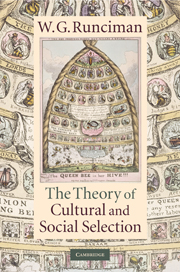Book contents
- Frontmatter
- Contents
- Preface
- Prologue: The Darwinian legacy
- 1 The neo-Darwinian paradigm
- 2 Natural selection and evoked behaviour
- 3 Cultural selection and acquired behaviour
- 4 Social selection and imposed behaviour
- 5 Selectionist theory as narrative history
- Epilogue: Sociology in a post-Darwinian world
- References
- Index
5 - Selectionist theory as narrative history
Published online by Cambridge University Press: 05 June 2012
- Frontmatter
- Contents
- Preface
- Prologue: The Darwinian legacy
- 1 The neo-Darwinian paradigm
- 2 Natural selection and evoked behaviour
- 3 Cultural selection and acquired behaviour
- 4 Social selection and imposed behaviour
- 5 Selectionist theory as narrative history
- Epilogue: Sociology in a post-Darwinian world
- References
- Index
Summary
STORIES OF STORIES
To insist, in the same breath as proclaiming the merits of a neo-Darwinian approach to comparative sociology, that there is no master narrative of human history is to invite the rejoinder that selectionist theory itself is an attempt to impose a master narrative of its own (Landau 1991). But although selectionist theory does bring with it a multitude of narratives, they are narratives of a kind which leave room for many others compatible with them. Since the agenda of comparative sociology is set by the observed resemblances and differences between human cultures and societies, every explanation of how a culture or society has evolved into being of the kind that it is will be a story about winning and losing memes and practices. But the just-so stories which succeed in so doing do not have authorial ‘plots’ in the way that ‘good’ stories, whether factual or fictional, are required to do (Welleman 2003). They have no conclusive endings, no contrived denouements, no privileged vantage-points, no preferential fields of thought and action, no paeans to virtue, and no denunciations of wickedness. They are stories about what has happened to go on in one or another part of the ever-branching evolutionary tree (or ever-flowing braided stream) out of which there continue to emerge new and distinctive cultural and social behaviour-patterns which are neither inexplicable nor pre-ordained.
- Type
- Chapter
- Information
- The Theory of Cultural and Social Selection , pp. 192 - 212Publisher: Cambridge University PressPrint publication year: 2009

